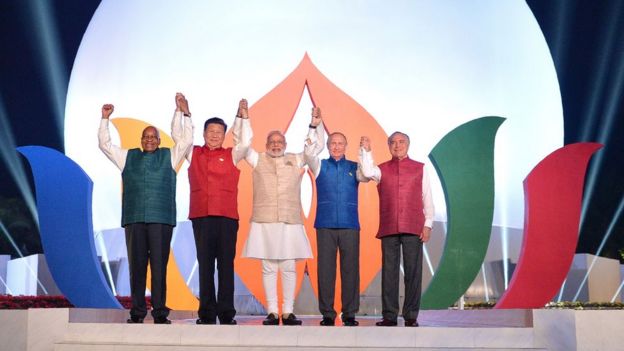
China backs Brics nations despite global uncertainty
China's president has said the long-term prospects of the Brics countries - Brazil, Russia, India, China and South Africa - are still positive despite a precarious global economy.
President Xi Jinping said the Brics countries were among those currently enduring slower economic growth.
But he stressed that the potential and strength of the group was "unchanged".
It comes as leaders of the Brics countries agreed in India to forge closer business and trade ties.
The grouping contains about half of the world's population and nearly 25% of world economic output.
Speaking at the Brics summit in the Indian resort state of Goa, Mr Xi referred to the recent slowdown in economic growth amongst the group.
But he added the position of the Brics "is still positive long-term" due to their resources and workforces.
Earlier this month, the International Monetary Fund cut its forecast for world economic growth in 2016, with Brazil, South Africa and Russia receiving some of the sharpest downgrades.

The Brics economies have been hit by falling global demand and lower commodity prices, while some have faced corruption scandals.
Brazil and Russia are both in recession, and Brazil on some counts is suffering its worst downturn since the 1930s.
South Africa narrowly avoided a recession last month, while China is going through its slowest economic growth in 25 years.
Still, Lord Jim O'Neill, the economist who coined the term "Brics", told the BBC he remained confident of the grouping's success.
Ahead of the talks, he said it is "bigger today [than] even in the most optimistic scenario I thought 15 years ago, and it's primarily because of China".
'Asian century'
At the summit, the Brics leaders agreed to set up a new credit rating agency and expand the role of emerging economies, and recognised the threat from terrorism.
In separate agreements, Mr Xi vowed to pursue closer ties with India and Russia as part of a wider Chinese push to foster global trade partnerships.
Indian Prime Minister Narendra Modi said India and China had a responsibility to join hands and turn the 21st Century into an Asian century.
Meanwhile, Mr Modi and Russian President Vladimir Putin signed multi-billion dollar energy and defence pacts on Saturday on the sidelines of the summit.




